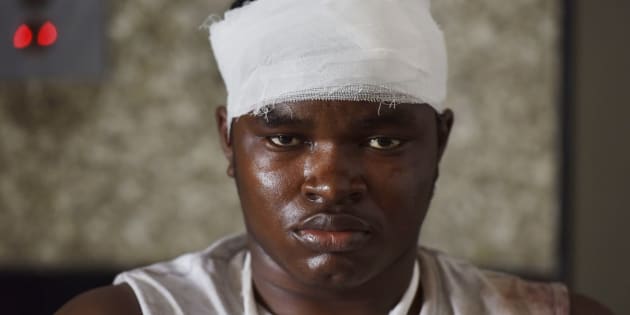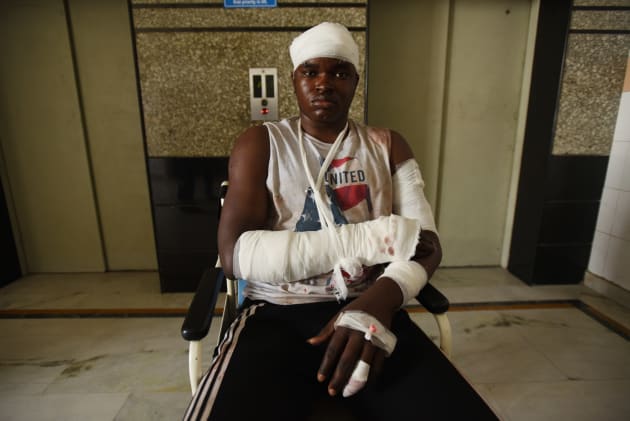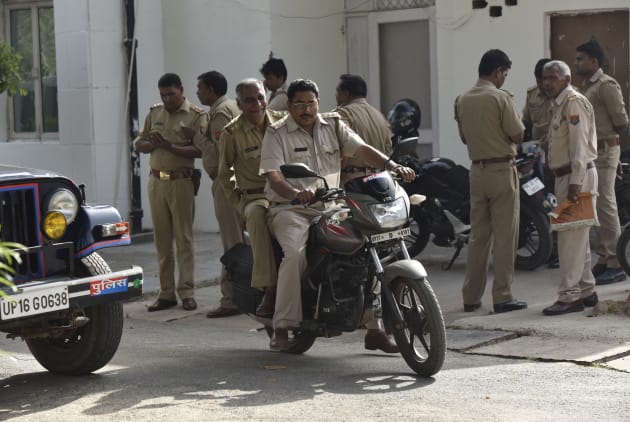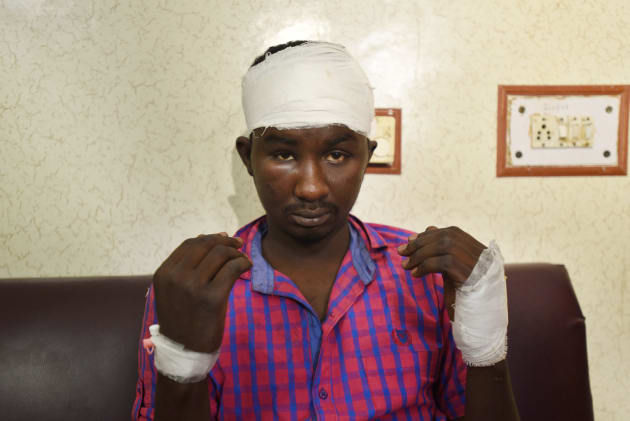
Precious Amalsima were admitted in Kailash Hospital post-violence on Monday evening in racial attacks on African nationals near Pari Chowk on March 28, 2017 in Greater Noida, India.
For too many Indians racism is a one-way street. We can be its victims but we are never the perpetrators.
We are quick to recognize it when it happens to us. For example, when Indian students were attacked in Australia, then prime minister Manmohan Singh said he was “appalled by the senseless violence and crime, some of which are racist in nature.”
When two Indian techies enjoying a drink in a bar in Kansas City in the USA were shot at by a man telling them to go back to their country we understood the xenophobia in that attack. If it was not investigated as a hate crime we would have been upset and justifiably so.
(Left to Right) Endurance Amarawa, Ibgiya Malu Chukwuma, Precious Amalsima were admitted in Kailash Hospital post-violence on Monday evening in racial attacks on Africans near Pari Chowk on March 28, 2017 in Greater Noida.
But when an India mob viciously sets upon a group of Nigerians in a mall in Greater Noida, right near our own capital, when lurid accusations of cannibalism are flung at Africans, we refuse see a “hate crime”, we refuse to smell “racism”.
Four Nigerians ended up in hospital after a mob held Nigerians responsible for the tragic death of a young student. They suspected he had been drugged by African nationals. Some Nigerians were picked up by the police but released due to lack of evidence. A march by local residents turned violent as they started assaulting anyone who looked Nigerian with chairs, metal dustbins, sticks and tools.
“They were kicking at us and shouting at us,” Precious Amalawa, one of the victims tells Scoopwhoop News. “We kept asking what had we done. Even dogs are treated better.”

One of the injured admitted at Kailash Hospital post-violence on Monday evening in racial attacks on African nationals near Pari Chowk on March 28, 2017 in Greater Noida.
Sushma Swaraj has said Uttar Pradesh CM Yogi Adityanath has promised a “fair and impartial investigation”. Uttar Pradesh health minister Siddharth Nath Singh has said “Attack on Nigerian students is a serious issue”.
But the district magistrate Nagendra Prasad Singh says “It is absolutely not a hate crime, nor is it some kind of anger against a race.”
Let’s pause here.
When Adam Purinton shows up with a gun in that bar in Kansas City and says “Get out of my country” to two Indian men who he thinks might be Iranian, he is racist. When a mob in Noida says the same to every dark skinned African it can find, it’s a culture clash?
In that incident an irate mob pulled every African it could find out of cars and beat them up. For being Africans. It cannot get more racist than that.
Nagendra Prasad Singh’s protestations feel like déjà vu. When a Tanzanian student was attacked in Bengaluru in 2016, the state’s home minister G Parameshwara said “It was not a racial attack but just a violent response to the accident (where a Sudanese student allegedly mowed down a pedestrian).”
In that incident an irate mob pulled every African it could find out of cars and beat them up. For being Africans. It cannot get more racist than that.
When a mob attacked African residents of Rajpur Khurd village in Chhatarpur with cricket bats, rods and bricks, shouting “Go back to Africa”, Delhi police chief Alok Verma refused to see a racist angle anywhere. The ministry of external affairs said all criminal acts should not be seen as racially motivated.
Are law enforcement officials, civil service officers and ministers unable to see the blatant racism or just unwilling to do so?
Even if hypothetically some local Nigerians were involved in the young student’s death, to punish every African in the area for the crimes of some is racism. Even if there is a drugs and crime problem with some African residents, to tar all of them with the same brush? That’s racism.
Are law enforcement officials, civil service officers and ministers unable to see the blatant racism or just unwilling to do so?
After the boy first went missing and a rumour went around that his Nigerian neighbours had eaten him. A mob burst into their house and in a chilling echo of Dadri rummaged through their refrigerator. The Telegraph reports these rumours are still rife at every paan shop and bus stand. “Our classmates are saying that we should keep a distance from these Africans because they eat human flesh,” Phil, a northeasterner tells the newspaper. To assume Africans are cannibalistic savages – that’s racism.
Posters and banners have appeared at busy crossings calling for “Nigerian-Free Greater Noida” Wanting to drive a group of people, by race or ethnicity, out of the neighbourhood? That is racism just as it was racism when Dotbuster gangs attacked Indians in Jersey City in the 1980s because it wanted to drive them out of town.
District Magistrate Singh thinks foreigners need to be “initiated to the Indian culture” to avoid such incidents. Perhaps our district magistrates, police officers and honourable ministers need to be initiated in a course of Racism 101 first. That needs to happen before the flag march that is happening now can be effective.
After the attack in Bengaluru, then foreign ministry spokesperson Vikas Swarup assured “stringent punishment” but insisted it was an “isolated incident.”
What does what happened in Greater Noida tell us about the promise of India and its greatness? That night in Noida, in that baying mob of hundreds, how many homegrown Ian Grillots could we claim?
If we still see these as isolated incidents, if we still keep seeing one as only an emotional reaction to an accident, another as only a heated reaction to a boy’s tragic death or a gross overreaction from mob misled by rumours, these “unfortunate incidents” will keep happening, proving that in our anxiety to project ourselves as a race-blind society, we are in reality just wilfully blind to our racism.
Just a few days ago Indian Americans raised $100,000 for Ian Grillot, the American who was wounded coming to the aid of those two Indian engineers at that Kansas City bar. “Ian Grillot is a man who reminds us of the promise of America and its greatness,” said Jiten Agarwal at the event in Houston. What does what happened in Greater Noida tell us about the promise of India and its greatness? That night in Noida, in that baying mob of hundreds, how many homegrown Ian Grillots could we claim?
Imran was admitted in Kailash Hospital post-violence on Monday evening in racial attacks on African nationals near Pari Chowk on March 28, 2017 in Greater Noida.



